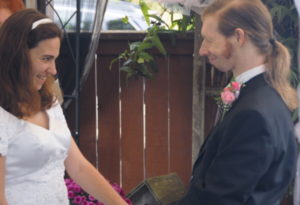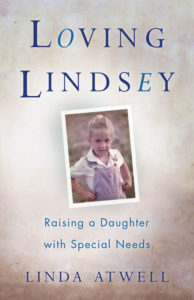
The newlyweds had their first fight. Ugly words were yelled. Voices were raised. Lines were drawn. Lindsey and Nick requested parental intervention.
In the 80s, I owned and operated a national catalog company and was able to give my kids jobs. At first, Lindsey and Michael counted catalogs into bundles of ten, then rubber banded them together. As they aged, Michael emptied warehouse trashcans; Lindsey cleaned the warehouse bathroom. They both broke down cardboard boxes and tossed them in the red recycle bin. But on their first payday, they held out their little hands, fingers twitching to cash their $25 paychecks.
But whoa. They couldn’t do as they pleased with this paycheck.
Even in the 80s, twenty-five bucks was a lot of money for a kid under the age of ten. We explained that parents worked and received checks too, but they couldn’t blow all the earnings on anything they wanted. Bills had to be paid and future expenses estimated and saved for–like car/house insurance, college, vehicle repairs, new roof, vacations. We intended to use this payday as an early money management lesson.
We drove to Washington Mutual and opened savings accounts. Ten dollars went into a college account, seven-fifty into a “something special” account (that was later used as their spending money on a vacation), ten percent (two-fifty) was given to a charity of their choosing (Sunday school or canned foods for the food bank or toward families we adopted at Christmas). The remaining five dollars was theirs to spend as they wished. Most of the time, the cash was spent in a flash on candy, coloring books, comics–with nothing to show for their two hours a week worth of labor except empty pockets.
At nineteen, Lindsey received Social Security Disability benefits and moved into an apartment. We sat down and established a budget. As her Representative Payee (the person responsible for making sure her bills were paid), I wrote checks for rent, utilities, phone, and cable. Lindsey slid the checks into the mailers, stuck on a return address label and a stamp, then dropped the payments into an U.S. postal box. We figured out how much she could budget for food and fun, found two #10 envelopes, and wrote FOOD and FUN MONEY on the outside with a black permanent marker. Lindsey understood, when the money in the envelopes ran out, so did the food, the fun. She quickly learned–if she wanted her money to last longer–that Western Family soup was cheaper than Campbells and she could afford one Snickers-mocha-iced-coffee each week instead of four.
For years, since no one else used these envelopes, the envelope method worked well for my daughter. But add one husband to the mix: chaos. Nick (34) had to budget too. His mother helped him pay his bills. Before they married, Lindsey and Nick agreed to contribute an equal amount of money into a joint account and pay all their shared household expenses with a communal checkbook. Each received his/her own spending money; each agreed to remain responsible for unique expenses associated only with him/herself. Yet during the first month of marriage, although my thirty-two year old daughter could verbally state the new money plan, said she understood the new money plan, she criticized Nick after they spent the entire contents of both the FOOD and FUN MONEY envelopes on groceries during one trip to Roth’s IGA.
“I didn’t tell you to spend it all!” Nick scolded Lindsey, his voice growing louder with each word. “I don’t like to share my money,” he said, shoving one of his twenty-dollar bills into her hand. Lindsey stomped off, turned around, screamed hurtful words at the man she’d recently promised to love and cherish. Nick shouted back at his bride, forgetting he’d recited the same vows.
At six o’clock on a Sunday night, the newlyweds and both sets of parents sat around our dining room table eating pizza, going over their pre-union, agreed upon budget. Lindsey nodded. Nick nodded. We wrote the budget down on a piece of paper. They bride and groom studied the calculations. Nick scratched his chin. Lindsey squeezed a strand of hair between her fingers. They nodded some more. “We understand now,” they said in unison, voices serious. They agreed on an equal amount of individual spending money, using the envelope method, how they’d handle their budget/bills next month. More nodding. More agreeing.
As we cleared, the table, I reminded Lindsey that neither she nor Nick should call each other hateful names. “Words can hurt,” I said, reminding her that a wife can never take back the mean things she says. “Maybe you shouldn’t call each other names that you wouldn’t want your parents (or Nick’s parents) to hear. “Pretend we are listening.” Lindsey nodded, grinned, then her eyes clouded.
“I really don’t understand where the money’s goin’,” she said, hands tremoring, shaking the paperwork in my face. “I think Nick’s gettin’ more than me.”
We all gathered back at the table and I started the explanation over. At the beginning. It was nine-thirty when the newlyweds walked out our front door with a freshly written budget in their hands. I dropped onto the sofa and closed my eyes, exhausted from explaining, repeating, trying different approaches, then repeating the budget again–using as many visual aids as I could muster. The money conversation felt like pushing cotton into a brick. Every once in a while a cobweb of cotton stuck on one of the rough edges and Lindsey fixated on that nubbin. By the end of the evening, I inspected my fingers, certain they were bloody and bruised from trying to make the cotton stick.
It’s been a month since that meeting. I’ve received several phone calls from Lindsey, asking for clarification on where the money for this comes from, or how this bill should be paid. They were the same questions we went over the evening of pizza, the same ones we discussed prior to their wedding day. But marriage and sharing money is life changing. Change is hard for any adult–but especially difficult for adults with special needs.
 John and I recently sat in a booth at Ixtapa with Lindsey and Nick. “She jabs me with her elbow in the middle of the night,” Nick said, his blue eyes gazed at my daughter the way a Basset hound looks at a treat. “But I love sharing my bed with her.” He batted his eyelashes. “I love waking up next to her.” My heart skipped a beat.
John and I recently sat in a booth at Ixtapa with Lindsey and Nick. “She jabs me with her elbow in the middle of the night,” Nick said, his blue eyes gazed at my daughter the way a Basset hound looks at a treat. “But I love sharing my bed with her.” He batted his eyelashes. “I love waking up next to her.” My heart skipped a beat.
“Yeah, we’re learning to sleep together in one bed.” Lindsey giggled, dipping a chip in salsa.
“We’re good,” Nick grinned, “as long as we don’t talk about money!”
They both nodded, their heads bobbing up and down in sync. I assured them that “it’s normal” for couples to struggle with their finances. “Money is a big issue in many marriages. If you master spending, it’ll be one less thing to argue about.”
“I hate sharing my fun money,” the newlyweds said at the same time, then looked at each other, and giggled.
Every month or so, I highlight a non-profit organization that offers support to people with special needs. This month, I’m featuring The Arc.
The Arc promotes and protects the human rights of people with intellectual and developmental disabilities and actively supports their full inclusion and participation in the community throughout their lifetimes. The Arc believes that all people with intellectual and developmental disabilities are defined by their own strengths, abilities and inherent value, not by their disability. For 60 years, The Arc has been on the front lines in making change happen for people diagnosed with Autism, Down syndrome, Fetal Alcohol Syndrome, and a range of diagnoses across the spectrum of intellectual and developmental disabilities. The Arc is the nation’s leading advocate for all people with intellectual and developmental disabilities and their families and the premier provider of the supports and services people want and need.
If you are looking for an organization that could use your help, consider The Arc. You can donate household furnishings, clothing, and other useful items–even cash. They often pick-up donations from your front porch. If you aren’t familiar with the good things The Arc does in your community, please click here to learn more. And remember, all donations to this organization are tax-deductible.
 My first book, Loving Lindsey: Raising a Daughter with Special Needs will be out September 26, 2017. If you would like to learn more, click here.
My first book, Loving Lindsey: Raising a Daughter with Special Needs will be out September 26, 2017. If you would like to learn more, click here.

